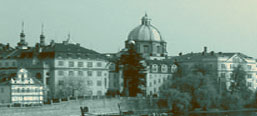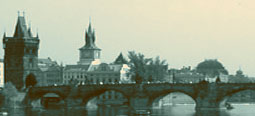


Timeline
- 1914: Beginning of World War I 1918: Independence of Czechoslovakia after World War I and the establishment of a Parliamentary republic under President Masaryk and National Assembly
- October 5th, 1936: Vaclav Havel born in Prague, Czechoslovkia
- 1938: Czechoslovakia cedes Sudetenland to Germany to avoid war
- 1939: Slovakia claims independence, Germans pour into Moravia and Bohemia beginning the German occupation
- September 1st, 1939: World War II begins with Hitlerís invasion of Poland
- May 7th,
1945: German surrender to the Allies and the end of World War II
- May 9th, 1945: Russian and American forced liberate Prague
- 1946: Russian
Communists gain control of the Czech government under Prime Minister
and later President Klement Gottwald
- 1948: Havelís family lost all their wealth and property in the Communist Russian occupation
- 1954: Havel
completes secondary education
- 1955: Warsaw Pact military alliance formed, including Czechoslovakia; Havel begins study at Czechoslovakia University of Technology, starts publishing articles in literary-theatrical magazines
- 1957: Havel graduates from Czechoslovakia University of Techonology, and fulfills military service in the Czechoslovakian Army
- 1959: Havel works as a stage hand at the ABC Prague Theatre
- 1962: Beginning
of the liberal period of Prague Spring under the leadership of Alexander
Dubcek and Ludvik Svobada; Havel enters Prague Academy of Dramatic Art
- 1964: Havel
marries Olga Splichalova
- 1968: Summer of Tanks begins with the communist invasion of Czechoslovakia against Dubcek, replacing him with the conservative Gustav Husak; crushing Havelís reform movement
- 1975: Havel arrested for a letter to President Gustav Husak protesting the oppression of the government and civil ills of the country
- January, 1977: Charter 77 human rights document produced and signed by citizens including Havel and distributed secretly throughout the country
- April, 1979: Sentenced to four and a half years of hard labor in addition to five years of prison for co-founding the Committee of Defense of the Unjustly Persecuted (VONS)
- 1989: Havel
becomes a leader of the Civic Forum, delivers rally in Vaclavsje Square
in Prague; Velvet Revolution in Czechoslovakia begins with support of
Czech civilians
- November 17th, 1989: Massacre of students at a demonstration in Wenceslas Square, beginning the bloodless Velvet Revolution
- November 24th,1989: Communist government resigns
- December 29th, 1989: After the establishment of a constitution, Vaclav Havel was elected as the country's new, nonpartisan president, and inaugurated at Prague Castle.
- June 1990:
Reelected for a term extending to 1992
- July 20th,
1992: Movement for a Democratic Slovakia emerges as Slovakia's leading
party begins Slovakian nationalistic movement for autonomy; Havel resigns
from office to show disapproval and unwillingness to preside over the
impending "Velvet Divorce"
- January 1st,
1993: Official dissolution of Czechoslovakia as a united country to
form Czech Republic and Slovakia occurred
- January 26th, 1993: Havel put back in office by election as President of the new Czech Republic.
- 1996: Olga
dies of cancer; Havel is diagnosed with lung cancer, suffers from chronic
bronchitis
- January,
1997: Marries film star Dagmar Veskrmova who had nursed him
- 1998: Havel
commences his final term as president (in accordance with parliamentary
limit of 2 consecutive 5-year presidential terms) despite doubts about
his ability to rule on account of medical complications; Havel has operation
on ruptured intestines
- 2002: Havel
hosts and organizes NATO summit at Prague, the capital of Czech Republic,
which doubled as an event of international farewell to his presidency;
Czech Republic invited to join the European Union
- February 3rd, 2003: Havelís official term termination after 13 years as president of the Czech Republic